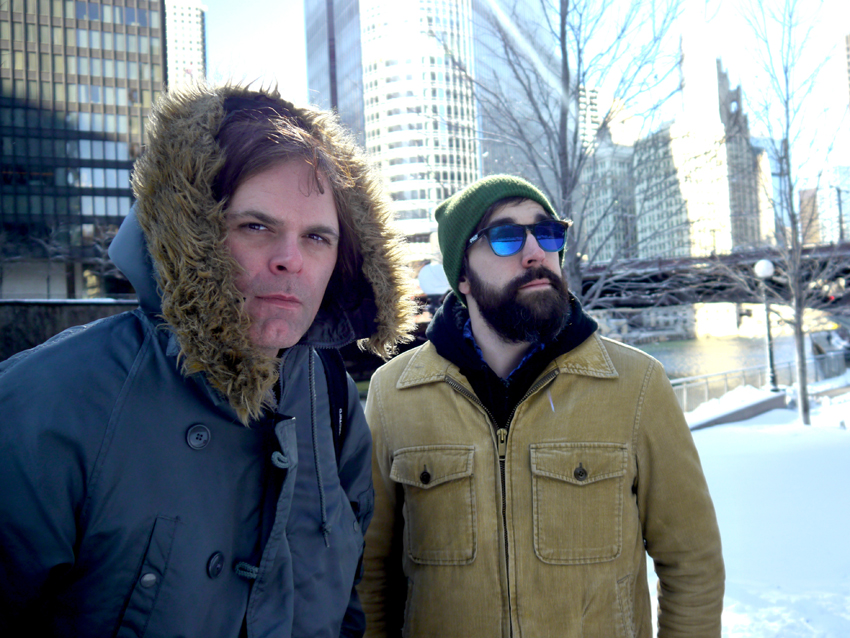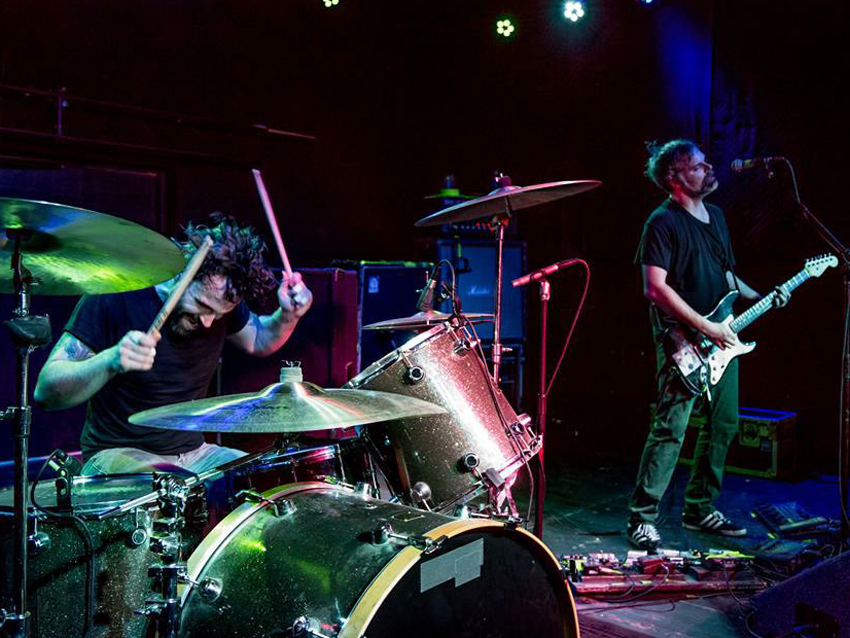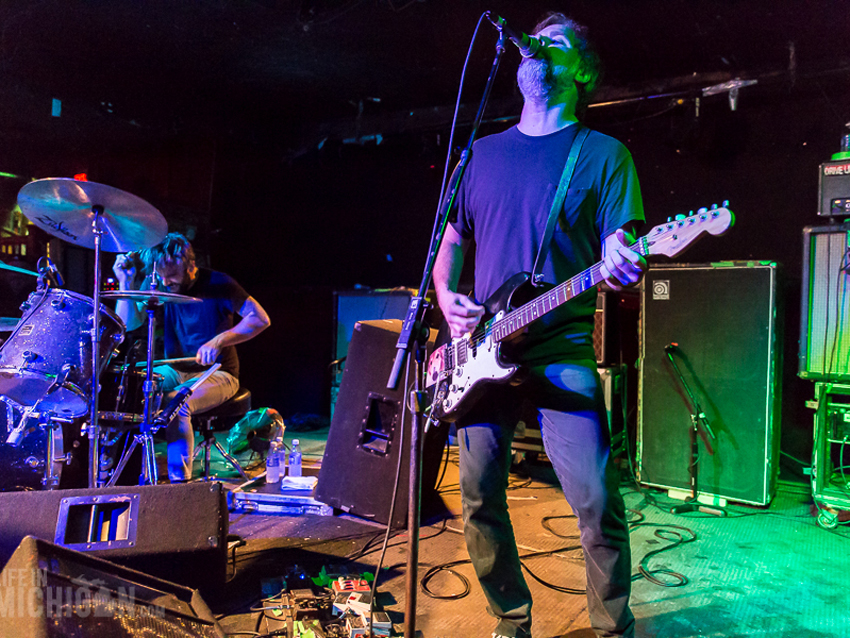
Scott Lucas talks riffs, rip-offs and recording Local H's Hey, Killer
Recently, Local H frontman Scott Lucas has been celebrating the band's 25th anniversary with a series of blogs chronicling each album the celebrated power duo has recorded, as well as notable career ups and downs. "It's been pretty interesting looking back," Lucas observes. "To be honest, I never thought about the band lasting that long. It’d be kind of strange if you did. But I do know that I never thought, ‘Wow, what am I gonna do after I stop playing music?’ Music wasn’t ever a phase for me; it wasn’t like experimenting with lesbianism in college. It was always something I was going to do forever.”
Lucas is highlighting the quarter-century celebrations with the release of the band's eighth studio album, Hey, Killer (due out April 14). Produced by longtime H confidante Andy Gerber and recorded at Gerber's Million Yen Studios as well as Steve Albini's Electrical Audio Studios in Chicago, Hey, Killer is the full-length debut of new drummer Ryan Harding (who replaced Brian St. Clair in 2013), and it's also the first album Lucas has recorded since a harrowing mugging in Moscow in 2013 that resulted in potentially career-ending throat damage.
Lucas sat down with MusicRadar recently to talk about the recording of the new disc, his voice recovery and how a cherished movie palace in his hometown of Zion, Illinois, inspired a song.
This is your first album with Ryan. How did "the new guy" do in the studio?
“He was great. No bumps in the road at all. We had recorded a couple of things before with some bands he had been in. I produced a double record for this one band of his and played bass in the studio, and I’d seen him play live for the last 10 years or so. There was really nobody else I was thinking about for the job. The plan was to tour together and get the chemistry figured out. We did a couple of EPs last year, too. I think we had our whole thing down before doing a full record.”
This is your first album since your mugging. You sound great – full and strong. Do you feel as though you’re 100 percent again?
“I don’t know if I’m 100 percent, but at this point, for me, I don’t know of 100 percent is necessary. When we play old songs, I’m sometimes like, ‘Ooh, that sure is high.’ I just don’t know that I’m interested in singing that high anymore. I listen to those old records and it sounds as if I’m 12.
“Most singers change a little bit as they get older. Listen to Robert Plant on Zeppelin’s first record and compare it to his singing on In Through the Out Door, or even his first couple of solo records. His singing on In The Evening – that’s the sound of a fucking man singing. It’s about as macho as you can get, which is awesome. It’s aged like fine whiskey. If I had to pick one, which I don’t, but if I had to, I’d definitely pick the In The Evening vocal versus anything on the first album.”
Making the new album, how much live off-the-floor recording did you do?
“We set up in Steve Albini’s studio, Electrical. We had Ryan in this huge silo room, and I had my own room encased in glass so we could see each other. I set up my entire rig, just as if I were playing a show. We played all the songs live together, and then we took it to Million Yen, Andy Gerber’s studio. We’d listen to guitar sounds – ‘Is that good? Should we keep it?’ If we didn’t like the sound, we’d strip it and replace it with something more interesting or something that fit the song better. But we definitely started with the live-sound bones.”

On writing riffs
You’ve worked with Andy for years. What do you like about what he does with the band?
“Andy was one of the first people we met when we started playing in Chicago. He saw us in the very beginning, so we’ve done demos together and all sorts of things. He knows me, and he knows what he can get out of me. He’s got good ideas. We came up together, really. We made the last record without him – that was his idea – and there were some vocal things that could have been better. I’ve really come to rely on him.
“He definitely has an opinion, and he’s not shy about voicing it. It’s not something that we don’t want to hear. Sometimes he’ll be a little cagey about it: ‘What’d you think, Andy?’ ‘Uh, I don’t know…’ And it’s like, ‘C’mon, Andy. Fuckin’ be a producer.’ And then he’ll tell us, and that’s it.”
I love the title of the first song on the record – The Last Picture Show In Zion. You’re a noted film buff, and you're now a published film critic. Is there a story that goes with the song?
“There is. The movie theater in the town where I grew up was torn down last year. A bunch of people sent me e-mails about it, and somebody even sent me a brick from the theater. It was an important place to me. It’s where I saw my first movie; it’s where I had my first job. So I wanted to write a song about it. Taking that away from the town was a real blow. The movie theater was the metaphor in The Last Picture Show – now the town’s really dead.”
In John The Baptist Blues, there’s a middle section that could function as its own song. Was that ever the case? Were these two songs you put together?
“No, I don’t think so. The idea for the song was just to cram as much in as possible. It’s kind of a vulgar display of power, and it shows what Ryan can do. It’s a little like a Rush song – tons of riffs and everything else. It’s a lot of fun to play live.”
The Misanthrope – are you talking about anybody in particular there?
“I don’t know. There are three themes on the record: religion, death and blues. This song is the first one written for the record, at a time when I maybe thought the album was going to be about religion. It’s a dark song, almost comically so. I think naming it after a French comedy means you can take it with a grain of salt. It’s so dark that it’s almost like, ‘C’mon.’”
And then we have City Of Knives, which features a terrific two-note riff. Riffs like that sound like they're easy to write, but they're really quite difficult to come up with.
“Exactly. A riff like that is almost like trying to get a fuzzy thread through a needle – if you think about it, you get lost where you are. You just have to let it happen or you’ll fuck up. Writing riffs is an interesting thing: You come up with them, and then you’re constantly going, ‘OK, did somebody do that already? I can’t believe nobody’s written this one yet.’ You listen to what you have and you’re like, ‘Is it...? Is it like something else?’ And then you think, ‘Well, maybe I can get away with it being an homage.’”

On other rock duos
What are your thoughts on the recent Blurred Lines case?
“Oh, man, that’s a bald-faced rip. To me, the tipping is hearing the people in the studio, like, ‘Havin’ a good time!’ Then you know they’re fuckin’ ripping off Marvin Gaye.”
I remember the Stones had a song, Anybody Seen My Baby?, and they part of it sounded like k.d. lang’s Constant Craving. They ended up putting her name on their song. Problem solved.
“Exactly. And bigger bands rip people off all the time. It’s like, when you fly to close to the sun on the wings of Marvin Gaye, you’re going come back down. You’re gonna get caught.”
You recently came clean about the origin of the band’s name, that you combined a couple of REM songs – Oddfellows Local 151 and Swan Swan H. Probably not the sexiest story one could think of.
[Laughs] “No, no, it’s not. That’s probably why we kept it a secret for so long. I could still say something else, I guess. I remember running into Peter Buck in LA. It was in a bathroom in a hotel. I told him, ‘Hey, we named our band after two REM songs,’ and he said, ‘Yeah. I know.’ I was surprised by that.”
A couple of years ago, you went through your guitar setup for us. You said at the time that it’s still a trial and error thing. Did you ever think to consult with a guitar company to see if they could perfect the design?
“No, not really. There’s been some talk about getting a patent on it, but for some reason or another, you can’t. It’s just one of those things. But I’d love to talk to a company about it. Sure, I love free guitars.”
Even though this record has themes, it’s not an outright concept record – as you’ve done before.
“No, it’s not. It’s super loose. It’s probably closer in spirit to PJ Soles or Here Comes The Zoo in that there are ideas running around, almost in spite of themselves. We wanted to get away from a hard concept album, but there are little threads that we couldn’t help.
“Putting together a concept record is like putting a puzzle together, which can be fun if you like to do that. I had the song Freshly Fucked for the last record, but it just didn’t work on a record about politics. No matter how much I liked it, it couldn’t fit.”
When yo got signed in the early '90s, the concept of a rock duo was very new. Now there's a ton of them. You were on to something.
“I'd like to think so, sure. I’ve always had an interest in duos, sort of a vested interest, obviously. You're right – there are so many duos now, so it makes me think, 'See? It was good idea.’ I liked the White Stripes when they were playing. I like what I’m hearing from Royal Blood. There are some good ones, but most two-piece bands still sound like they’re ripping off the White Stripes. Occasionally, though, I’ll hear something and I’ll think, ‘OK, they’ve got a bit of their own thing there. That’s pretty good.’ It doesn't happen too often, but when it does, it's cool."
You can pre-order Local H's Hey, Killer (due out April 14) at Amazon. CD and vinyl editions can also be pre-ordered at G&P Records.
Joe is a freelance journalist who has, over the past few decades, interviewed hundreds of guitarists for Guitar World, Guitar Player, MusicRadar and Classic Rock. He is also a former editor of Guitar World, contributing writer for Guitar Aficionado and VP of A&R for Island Records. He’s an enthusiastic guitarist, but he’s nowhere near the likes of the people he interviews. Surprisingly, his skills are more suited to the drums. If you need a drummer for your Beatles tribute band, look him up.
